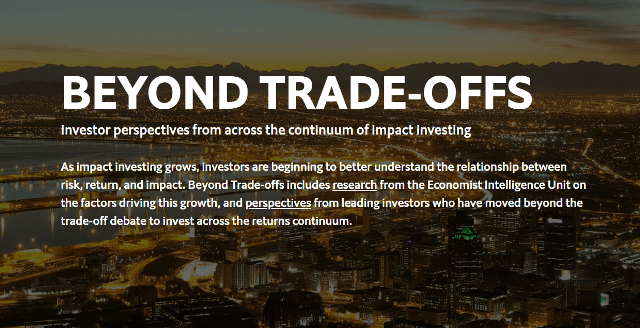In the fast-growing impact investing sector, a contentious debate has been brewing. Does genuine impact always require a sacrifice of financial returns? Or should impact investing always seek market-rate returns, accepting activist-musician Bono’s explanation that any lower returns in the past were due merely to “bad deals done by good people?”
Over the past decade, as impact investing has grown from a concept into a sizable sector with more than $228 billion currently invested, these questions continue to plague the industry. Gains in momentum and impact investing’s potential are hindered by this debate on trade-offs.
The reality, however, is far more nuanced. Even as the field continues to debate whether impact investing does or does not achieve market-rate returns at the sacrifice of social impact, we have found that leading practitioners have moved past this conversation to create highly nuanced and sophisticated portfolios of impact investments that target different levels of financial returns, different types of social impact, and a broad spectrum of risk profiles. This disconnect between the public debate and the actual diversity of investment opportunities available is creating confusion among existing, new, or potential impact investors, and may impede the healthy development of this market.
FSG recently partnered with Omidyar Network to curate a new series, “Beyond trade-offs: Investor perspectives from across the continuum of impact investing,” to showcase a set of examples from leading impact investors that showcase the diversity of investment approaches helping to shift the debate and bringing new investors to the table.
In addition to Omidyar Network, authors include Access – The Foundation for Social Investment; Big Society Capital; Bill & Melinda Gates Foundation; Blue Haven Initiative; Elevar Equity; Ford Foundation; Goldman Sachs; Lok Capital; Prudential Financial; and The Rise Fund.
The group features different types of investors (family offices, foundations, institutional investors, insurance companies, and asset managers), investment approaches, and geographies. Authors demonstrate why different investors take different approaches based on their mandates and motivations, as well as how these approaches may vary within their portfolios.
Key takeaways from the series include:
- Savvy investors have moved beyond the trade-off debate of financial returns vs. social impact to develop sophisticated approaches that deploy capital at multiple points along a continuum.
- Under certain circumstances, it is indeed possible to achieve risk-adjusted, market-rate returns with substantial social impact.
- At the same time, not all types of impact can generate market-rate returns. The series also highlights rigorous approaches to deploying subcommercial capital in pursuit of different kinds of impact in underserved markets.
The series was launched at the 2018 GIIN Investor Forum in Paris, France, and is available on The Economist’s digital platform at beyondtradeoffs.economist.com, along with a report on the state of the impact investing industry from the Economist Intelligence Unit (EIU).
We hope that this series will broaden the conversation among existing and potential investors and help asset owners and new investors better understand the full spectrum of opportunities available within impact investing.
To learn more about FSG’s work in impact investing, contact us:

